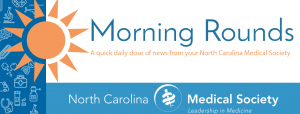Enjoy your Thursday NCMS Morning Rounds.
May 6, 2021
NCMS Issues Joint Statement to Encourage COVID-19 Vaccination
Yesterday the NCMS and the NC Academy of Family Physicians issued a joint media statement urging all eligible North Carolinians to get vaccinated against COVID-19. Now that more medical practices are receiving vaccine supplies, patients have yet another way to access the vaccine in a familiar environment where they can have their questions answered by their trusted physician or PA. Read the statement here.
If you have questions or would like to participate in the vaccination effort, the NC Department of Health and Human Services (NCDHHS) has this ‘road map’ to guide you through the process, including how to request allotments of vaccine to accommodate your patient population. View the road map here.
FDA Bans Menthol Cigarettes – Celebrate No Menthol Sunday on May 16
Last Thursday, the FDA announced it is beginning the process of banning menthol cigarettes and flavored cigars. This action is a critical step towards addressing the tobacco use epidemic and tobacco-related disparities. Read the announcement here.
Despite decades of successfully reducing tobacco use in the U.S., the progress has not been equitable. Specific populations, who have been targeted and disproportionately impacted by tobacco use, continue to use tobacco at higher rates. For example, 85-90 percent of African American cigarette smokers choose menthol flavored cigarettes, while only 30 percent of white cigarette smokers do. Studies show that mentholated cigarettes make smoking easier to start and more difficult to quit than do other cigarettes.
If implemented and equitably enforced, the FDA’s ban on menthol cigarettes and flavored cigars will keep these products off the market, and at the same time will not penalize those who purchase or possess tobacco products.
Update on Information-Blocking Rules from the 21st Century CURES Act
The regulation implementing the 21st Century CURES Act’s prohibition on information-blocking went into effect on April 5 despite the fact that many provider groups are voicing concerns that the Centers for Medicare and Medicaid Services (CMS) has not offered adequate guidance for them to determine how to comply. At present, U.S. Health and Human Services (HHS) lacks the authority to penalize health care providers for non-compliance; nonetheless, all providers will need to come into compliance with these rules at some point in the future, and doing so raises substantial legal, technical and training issues.
For more information about the new data-blocking requirements, see the following resources:
• This site has some general information: https://www.lifeimage.com/solutions/provider-exchange/onc-compliance
• The American Medical Association has issued a brief entitled “How do I comply with info blocking and where do I start?”
• HHS has extensive FAQs available here: https://www.healthit.gov/curesrule/resources/information-blocking-faqs
Reminder: there was a session at the Primary Care Conference about Information Blocking. If you registered for PCC you can still access a recording of the session through the conference website
In the News
FDA Expected To OK Pfizer Vaccine For Teens Within Week, AP News, 5-3-21
Learning Opportunity
Financing that Rewards Better Health & Well-Being Workshops — A Free Workshop Series
May 25 | 2 to 5:30 pm
May 28 | 1 to 4:30 pm
June 2 | 2 to 5:30 pm
The discussion in this National Academy of Medicine series will address five objectives:
- Describe the deficiencies in our current health delivery and financing systems for creating health and sustaining health care delivery in light of the COVID-19 pandemic.
2. Identify and describe alternative payment models demonstrating major transformations in health care delivery and financing, address those deficiencies, and summarize their characteristics and designs.
3. Describe how integrated financing approaches can be used to redirect payment for individual services that may be unnecessary or even harmful toward payment for care of the whole person, equitable population health outcomes, improved patient and provider experience, and reduced per capita costs.
4. Evaluate how care models using integrated financing have adapted to the COVID-19 pandemic to create whole person-population health and remain financially viable.
5. Identify practical strategies and financing approaches that effectively reward whole person-population health.
Day 1 of the workshop series will focus on envisioning an integrated health care delivery and financing system.
Day 2 of the workshop series will focus on examining innovative models and levers underscored during the COVID-19 pandemic.
Day 3 of the workshop series will focus on a roadmap for integrated payment approaches to efficiency, effectiveness, and equity.
If you have policies you’d like your NCMS Board of Directors to consider, please complete the Board input form here. Thanks for reading!

